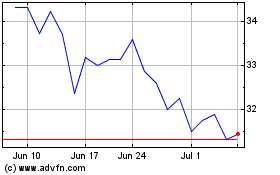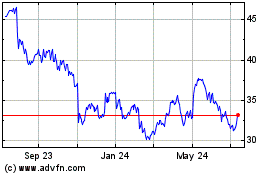Harman CEO Expects to Double Revenue in 5 Years
January 25 2016 - 5:40PM
Dow Jones News
Harman International Industries Inc. Chief Executive Dinesh
Paliwal said he intends to double the company's revenue over the
next five years, fueled by a big backlog of orders from auto makers
anxious to buy his high-tech multimedia systems.
Mr. Paliwal on Monday was in a northwest suburb of Detroit to
open a new office that will employ 1,000 people and serve as the
company's largest research and development center aimed at
designing new car technologies to support everything from
infotainment to hands-free driving. The company is expected to
finish its 2016 fiscal year with $7 billion in revenue and a
backlog of orders totaling $23 billion.
The company is best known for its audio systems, which take the
form of more than a dozen brands, including JBL, Harmon/Kardon,
Infinity, Revel and Mark Levinson, among others. But increasingly
Harman's focus has been on developing the software that allows
digital interfaces inside the car to work. Mr. Paliwal estimates
that 80% of the value of Harman's products are software code, and
he is already planning to outsource more hardware
manufacturing.
Perhaps no company in the auto space has done more in the past
year and a half to try to evolve. That has included making $1.5
billion in acquisitions, gobbling up Symphony Teleca, an
8,000-employee software development company in Silicon Valley, and
Red Bend, an Israeli software firm that handles over-the-air update
capabilities. Its latest purchase came three weeks ago -- a network
security company called TowerSec.
Mr. Paliwal said Harman will be able to leverage the purchases
into much more revenue. Its sales are forecast to rise to $7
billion for the fiscal year that ends June 30, almost twice the
$3.7 billion it booked in 2010.
"My aspiration would be of us to double our revenues again," he
said.
Investors initially cheered the investments in Symphony Teleca
and Red Bend, sending Harman's shares to record highs. In April the
stock hit $146 a share after starting 2015 around $100. It has
since plunged to around $78.
Brian Johnson, an automotive analyst with Barclays, said
investors may fear that Harman and companies like it, could be
pushed aside by the emergence of Alphabet Inc.'s Google Android
Auto and Apple Inc.'s CarPlay, as the tech giants invest more into
cars. The emergence of these new highflying competitors has put
pressure on Harman as well as traditional parts suppliers such as
Lear Corp. and BorgWarner Inc. that for decades quietly provided
auto makers everything from engine components and brakes to tires
and seats.
Some are selling off businesses, but most are making
acquisitions to increase their high-tech offerings or refine what
they already make.
For example, Delphi Automotive PLC has shed its past of churning
out commodity components—such as steering systems—and is now a car
tech leader producing the electrical systems in vehicles and the
advanced sensors that allow for autonomous driving capability. It
made a handful of acquisitions last year, including
Pittsburgh-based Ottomatika Inc., an autonomous vehicle control
company.
ZF Friedrichshafen AG Chief Executive Stefan Sommer, said
earlier this month that suppliers need to buy technology companies
if they want to compete. ZF purchased TRW Automotive Holdings Corp.
last year.
"The automotive world needs to see the opportunities and the
technologies of the digital world," he said.
Write to Mike Ramsey at michael.ramsey@wsj.com and Jeff Bennett
at jeff.bennett@wsj.com
(END) Dow Jones Newswires
January 25, 2016 17:25 ET (22:25 GMT)
Copyright (c) 2016 Dow Jones & Company, Inc.
BorgWarner (NYSE:BWA)
Historical Stock Chart
From Mar 2024 to Apr 2024

BorgWarner (NYSE:BWA)
Historical Stock Chart
From Apr 2023 to Apr 2024
